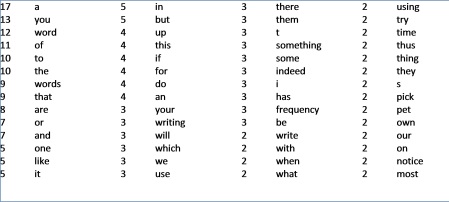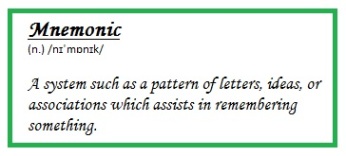Everyone has a word (or two) that they really like to use. I know I do, and every work I have ever edited has one word that just keeps popping up. Some of them are words like ‘thus’ or ‘indeed,’ some are adjectives such as ‘bright’ or ‘luscious,’ but believe me, every writer has at least one. There’s nothing intrinsically wrong with these words; thus, indeed, bright, and luscious are all perfectly good words with their place in writing. The problem is when they appear everywhere.
It’s difficult to notice in our own writing when we are overusing a word, or even a few different words. An editor will pick up on them, but sometimes you don’t want to hire one for a short document or something that won’t be published; who hires an editor for a cover letter, after all? A friend reading over it might notice them, but most people aren’t trained to look for that kind of thing. So what do you do?
There are a few options available for spotting this kind of thing on your own.
Word frequency counters: There are web-based word frequency counters, like this one from Write Words, in which you paste a selection of text, and it gives you the frequency of each word that appears. Naturally, articles and conjunctions (a, an, and, or, if, etc.) are going to top the list in most cases, but it can give you some insight into the words you use.
Manual search: A bit more time consuming, but available without internet access, you can also pick out individual words from a page and do a ‘find’ using your word processing program. This will give you a total number of times that word appears in your document. This usually works better if you already suspect that you overuse a particular word. If not, you’re going to spend quite a bit of time entering individual words to see what comes up.
Conscious writing: As you write, try to be aware of which words you are using. Often, a pet word crops up because we like something about it; the image an adjective conjures, the phrase emphasis of something like ‘indeed’ or the generic usefulness of a verb. If we try to be aware of our language, and use the word that best suits the intended meaning, rather than the one that seems more comfortable to us, which will eliminate many pet word incidents.
As an example, I ran this piece through a word frequency counter, and got the following results:
Of this list, it makes sense that ‘a’ is at the top, and that ‘word’ and ‘words’ show up frequently, as this is a piece specifically about words. Most of the other words in the upper range are the conjunctions and common usage words we would expect to see. The word ‘like’ is a bit more frequent here than it should be, but not concerning, so I can make a note to watch out for that one in the future. Of course, there were a large number of words that showed up once or twice that I didn’t bother to include.
There is only one word that stands out to me, as an editor, and that is ‘you.’ It shows up thirteen times here, which is fairly high frequency. While too common to qualify as a pet word, it makes me realize that the tone of this piece is second person instructional; I am speaking directly to the reader and giving examples as if they were writing them. This allows me to sit back and think, “Did I intend this? Is this the tone I want for this writing?” Since this is aimed at helping people improve their writing, I can decide that yes, it is, and leave it be.
Good luck in finding your pet words and giving them a much needed vacation.
Happy writing!
 To demonstrate, here are a few birds flying over a cloudy sunset, but we can’t help but see them as smiley faces. Isn’t pareidolia cool?
To demonstrate, here are a few birds flying over a cloudy sunset, but we can’t help but see them as smiley faces. Isn’t pareidolia cool? Contractions are a common variant of homonyms; if the apostrophe doesn’t indicate a possessive, such as “Samantha’s book,” then it’s a contraction. They can often be eliminated as a confusing homonym by simply expanding the contraction.
Contractions are a common variant of homonyms; if the apostrophe doesn’t indicate a possessive, such as “Samantha’s book,” then it’s a contraction. They can often be eliminated as a confusing homonym by simply expanding the contraction.